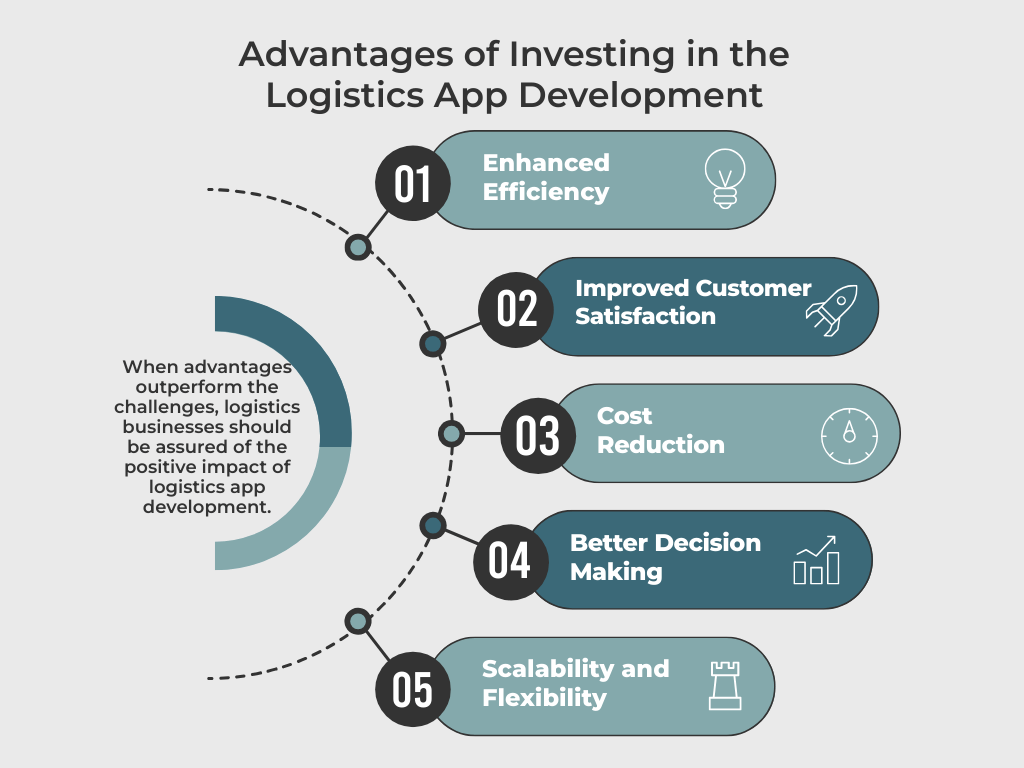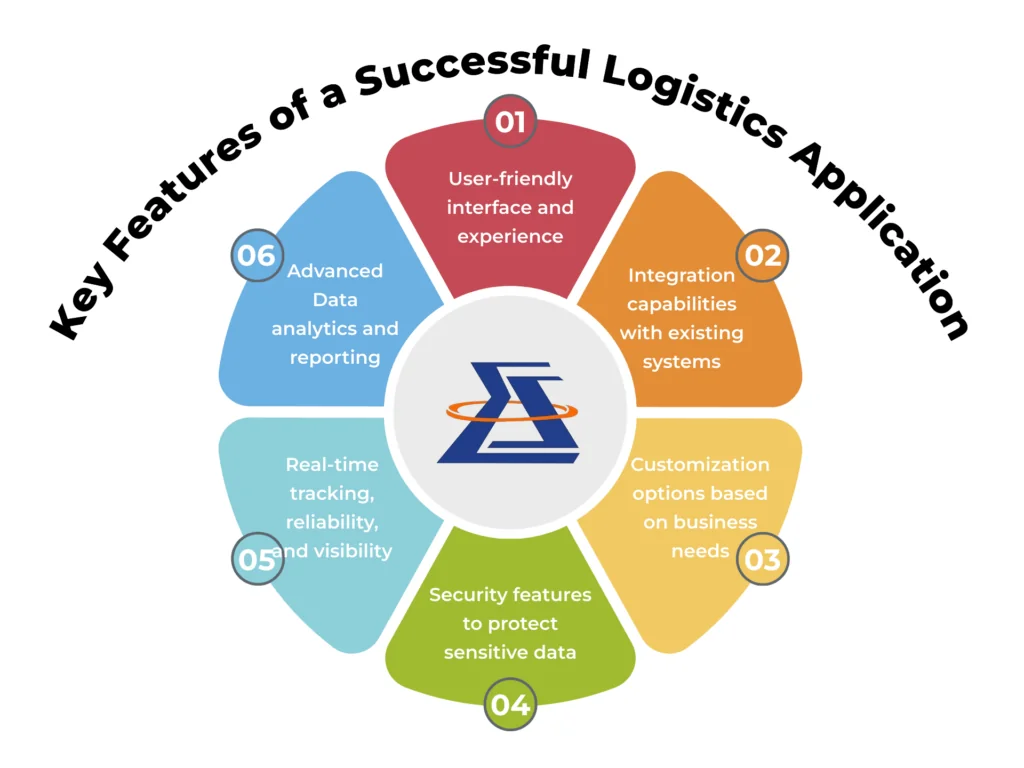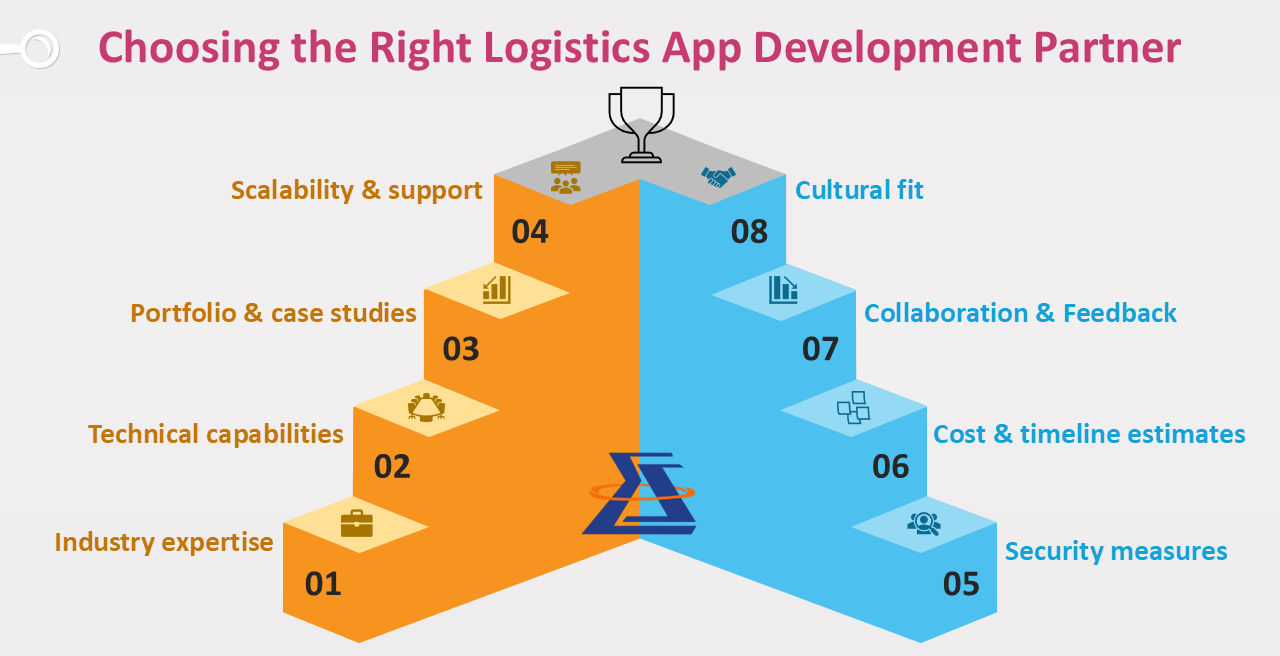views

Introduction
Riding the technology wave, the logistics sector in the US has been witnessing a miraculous transformation. Consequently, logistics businesses are espousing custom logistics application development that can adequately resolve their challenges in the supply chain and transport management processes.
Logistics application development is the development of specific software solutions to address the tactical problems of the supply chain and transport management processes. Amid the constant changes in the global economy, the purchases made to modern supply chain management applications have become even more relevant for businesses willing to improve enterprise performance.
Synopsis
Logistics mobile app development comes with countless benefits that outnumber challenges. It improves operational efficiency, streamlines workflow, increases working capacity, improves load visibility, saves money, and improves decision-making.
This blog will evaluate the challenges the logistics sector faces in the US and will discuss the benefits of investing in logistics application development. We will also discuss various strategies to improve the ROI of the logistics businesses.
Understanding the Logistics Industry Challenges
At Sigma Solve Logistics Tech, we have identified a few growing challenges in the logistics industry. Outsourcing app development companies such as Sigma Solve have been analyzing some common pain points in the US logistics sector.
Common Pain Points In The Logistics Industry
Lack of Visibility:
Customers are usually faced with bad tracking systems, where there is no update on the status of a shipment in real time. This is quite dangerous since customers do not get to be in touch with the company’s progress and can become frustrated, thus affecting their trust in the company.
Complex Documentation:
The logistics industry entails the provision of several documentation forms, particularly when involving the international transport of goods, such as customs forms and other transitional compliance papers. This complexity can be confusing to customers, making them make mistakes and possibly affecting the timely delivery of consignments.
Cost Transparency:
Extra charges, or charges that the customer never sees inflate their bill, are a notorious thorn in the flesh. Transparency of the price that the logistics firm offers to its customers is crucial in order to foster credibility in the transaction process.
Delays and Uncertainty:
Customers may be subjected to shipping delays, and this is a result of one reason or another, hence making the customers discontented. On the second level of fleet management applications, the effectiveness of operations and timely flow of information are very sensitive because the aim is to reduce risks and keep customers informed.
Cargo Damage and Loss:
Consumers regularly report their apprehensions about the protection of goods during transport. These concerns can be eased by having proper quality control measures put in place, and an insurance policy can also be provided.
Communication Challenges:
When there is no proper interaction, it causes problems in customer support, and they remain dissatisfied. Persons are also concerned with the availability of responsive and accessible customer service, especially in relation to attending to queries and complaints.
Customs and Compliance:
Wrestling with such regulations takes time and money, which becomes a challenge for customers. It is crucial to ensure that expert advice and support are available to enable the company to conform to specific and relevant structures in the shipping industry, as this will facilitate the reduction of penalties incurred and the general flailing of the system.
Limited Shipping Options:
Since customers are unique, a universal method of execution cannot be effective for shipping needs either. The availability of different delivery methods means that companies can serve their client’s needs to the optimum level.
How Challenges Impact Logistics Businesses
These logistics sector problems negatively influence businesses and throw businesses off the competition track.
- Increased operational costs
- Reduced customer satisfaction
- Inefficient resource allocation
- Slower response time to markets
- Ambiguity around the operations model
- Expanded risks of supply chain vulnerability
Advantages of Investing in the Logistics App Development
When advantages outperform the challenges, logistics businesses should be assured of the positive impact of logistics mobile app development. These advantages include increased organizational performance, effectively addressing the needs of customers, a tremendous reduction of costs, an improved capability for decision-making, and improvement in overall organizational capacity to adapt to the growing needs of the business environment.

Enhanced Efficiency
Management applications in the area of logistics make work easier by triggering some functions mechanically, thus minimizing human interference. For instance, transportation management might help to have 50% less route planning time and 20% more efficient vehicle utilization in terms of time and money.
Improved Customer Satisfaction
Some of the features that are improved in custom logistics solutions include real-time tracking and communication, which make customers satisfied since they give them an accurate estimated time of delivery and regular updates. It is also important to be transparent, and this can help to gain up to 25% of the satisfaction score among customers and a reduction of customer requests by up to 15%.
Cost Reduction
Some of the benefits associated with custom logistics solutions include reduced operating costs due to the use of applications that can work out some tasks on their own. For example, simplification of inventory management means that carrying costs can be cut by up to thirty percent, whereas cases of stock-outs can be paid by twenty percent. Usually, such investments yield an ROI of more than 200% in a year.
Better Decision Making
Logistics applications of data analytics offer important information for planning purposes in the management of a business. Examples prove that numerous firms can make a more precise forecast of the required stocks by 25%–50% when using data logistics; thus, companies can avoid unnecessary and expensive storage and can manage stocks effectively using inventory management software.
Scalability and Flexibility
Flexibility in logistics management also implies that companies can easily grow and adapt to the market without experiencing tremendously high implementation costs. Real-time tracking in logistics can be adapted to meet new business processes, regulations, or the market, which makes logistics applications sustainable.
Key Features of a Successful Logistics Application

User-friendly interface and experience:
Solutions that enhance the ease of use of Automated logistics solutions by eliminating several steps inherent in the profession and decreasing the time required to teach a new system to the end user.
Integration capabilities with existing systems:
Integration with other business systems, such as ERP and TMS systems, to curtail the occurrence of disparate data systems within the organization.
Customization options based on business needs:
Some of the specific characteristics may be adapted to meet the needs and requirements of particular industries, making the application more valuable and useful.
Security features to protect sensitive data:
Solutions for strong encryption and secure access to data to prevent data leakage and meet legal requirements.
Real-time tracking and visibility:
Real-time, accurate, and current information about the shipments, inventory, and assets to be able to deliver reliable information for decision-making and for serving the clients efficiently.
Advanced analytics and reporting:
Tools for data analysis that include all-around data, providing organizations with trends for organizational improvement.
Choosing the Right Logistics Application Development Partner
Factors to consider when selecting a development company

Industry expertise:
Find a partner with practical experience in logistics software development since they will know what to avoid and what methods are now the most effective.
Technical capabilities:
Evaluate the company’s expertise in technologies, frameworks, and integration approaches, which are vital for custom logistics solutions.
Portfolio and case studies:
Review your past projects and success stories and find out how similar solutions were developed by the particular developer.
Scalability and support:
Make sure the partner can grow out of the shell and can deliver constant maintenance and updates to the application.
Security measures:
Ensure that the company, with regards to data protection, follows industry standards and this compliance is duly documented.
Communication and collaboration:
Choose a partner with dedicated communication lines and an organized method of working on a project.
Cost and timeline estimates:
Consider price offers as well as time estimates of each proposed development cycle provided by a certain vendor.
Cultural fit:
To enhance easy working relationships, the management of the organizations should ensure that the selected provider has a similar work culture and organizational values.
Importance Of Industry Experience And Expertise
Companies must develop applications based on logistics, and expertise plays a very significant role in that. An experienced partner in logistics also comprehends specific issues related to transportation, legal constraints, and trends.
This expertise comes out in the development process, the features that are then incorporated, and the solution that is actually provided to the problem in various industries.
Questions To Ask Potential Partners
- Are there some of the logistics applications that you have implemented, and how has it affected the clients?
- How are data security and compliance then incorporated into the workings of logistics software?
- How and where do you write an integrated interface to current programs, if at all?
- Concerning scalability and future advancements, how do you implement it in your automated logistics solutions?
- Which techniques do you employ in the management of the project and the quality?
Tips For Successful Partnerships
Clear communication:
It also means that the innovations should be created with feedback and regular updates as the two major axes.
Detailed requirements:
List down clients’ requirements and get their assent on the document to avoid a situation where clients demand more than what you committed in a specific amount and time.
Agile methodology:
Adopt an iterative development model since this will enable changes and improvements on the application to be made as they are developed.
Collaborative testing:
Always submit the application to key people who will use it in its working environment so as to determine initial pre-production test suitability.
Knowledge transfer:
Incorporate training and documentation for use throughout the organizational processes with the purpose of ensuring proper implementation of the software in its entirety.
Phased implementation:
One also needs to take measured steps to avoid downfalls and ensure that they make some changes after the first experiences from the users.
Regular reviews:
Have regular assessment meetings in relation to the status and desired changes in the goals and timeframes of the project.
Long-term vision:
Future Changes and Maintenance should provide suggestions on how the application could grow with your business needs should they arise in the future.
Source: https://www.sigmasolve.com/what-are-the-benefits-of-investing-in-logistics-application-development/





















Comments
0 comment